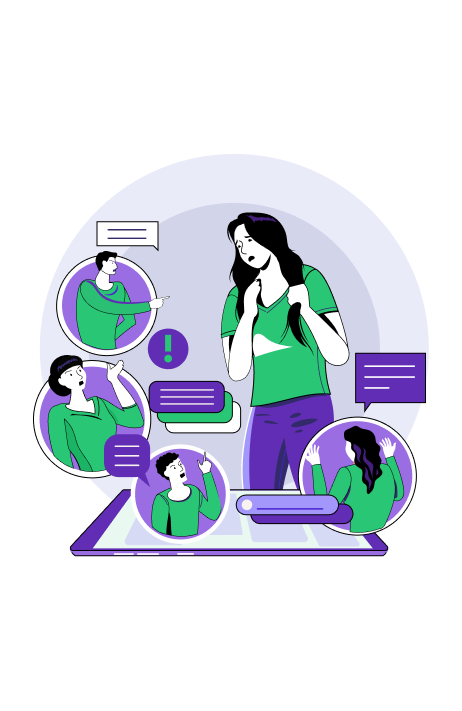
Finding support: Resources for those affected by online harassment
Online harassment is a serious issue that can have a significant impact on the mental health and well-being of individuals. Finding support when dealing with online harassment is crucial as it can help victims cope with the psychological effects of the harassment, regain a sense of control over their lives, and build resilience.
Support can come from various sources, including family and friends, mental health professionals, victim support services, and online communities. However, there are several challenges that individuals may face when seeking support for online harassment.
Types of online harassment that content creators experience
Content creators may experience various types of online harassment, including:
- Cyberbullying: The use of digital technologies to bully, harass, or intimidate individuals.
- Doxxing: The act of publishing an individual’s personal information online without their consent.
- Harassment or hate speech: The use of threatening or abusive language or actions targeted at an individual or group based on their race, gender, sexual orientation, religion, or other characteristics.
- Stalking: The act of repeatedly harassing or following an individual, both online and offline.
- Trolling: The act of posting inflammatory or offensive comments online to provoke others.
These types of online harassment can have a notable impact on a person’s emotional well-being. They can cause feelings of fear, anxiety, and depression, which can affect a person’s ability to work, create, and engage with their audience. Online harassment can also lead to physical health problems, such as headaches, insomnia, and even post-traumatic stress disorder.
The different resources available for those affected by online harassment
There are a variety of resources available for those affected by online harassment, including:
- Online support groups: Online communities such as Reddit, Facebook Groups, and forums offer a place to connect with others who have experienced similar online harassment and to provide emotional support to one another.
- Hotlines: Hotlines such as the Cyber Civil Rights Initiative Hotline, the National Domestic Violence Hotline, and the National Sexual Assault Hotline offer confidential support and resources to those affected by online harassment.
- Organizations: Organizations such as the Cyberbullying Research Center, StopBullying.gov, and the National Center for Victims of Crime offer resources and support to individuals affected by online harassment.
It’s important to note that some resources may be more appropriate for specific types of harassment, such as cyberstalking or revenge porn. It’s also important to consider seeking professional help from a mental health provider or a legal advocate, depending on the severity and nature of the harassment.
Tips and strategies for finding the right support
If you are seeking professional help and trying to find the right support for you, here are some tips and strategies that may be helpful:
- Identify your specific needs: Take some time to reflect on what you need help with. Be specific about the challenges you are facing, the symptoms you are experiencing, and the outcomes you hope to achieve from seeking support.
- Consider your preferences: Think about your preferences when it comes to seeking support. Would you prefer a male or female therapist? What type of therapy are you interested in (e.g., cognitive-behavioral therapy, psychoanalytic therapy)? Do you want to work with someone who shares your cultural background or speaks your primary language?
- Check their credentials: Make sure the provider you are considering is licensed to practice in your state and has the appropriate training and qualifications for the type of therapy you are seeking.
- Be open and honest: When you do start working with a provider, be open and honest about your concerns, symptoms, and challenges. This will help them better understand your needs and provide more effective support.
Remember, seeking professional help is a sign of strength, and finding the right support can be a key factor in your overall well-being.
The importance of self-care
Self-care is a crucial aspect of mental health and well-being, particularly when dealing with online harassment. Online harassment can be emotionally draining, overwhelming, and traumatizing, and it can have a significant impact on mental health. By reducing stress, promoting self-compassion, enhancing physical health, and strengthening support systems, self-care practices can help individuals to cope with the negative effects of online harassment and protect their mental health. It is important to prioritize self-care and seek support when needed.
The role of therapy and counseling
Therapy and counseling can play a crucial role in supporting individuals who have experienced online harassment. By creating a safe space, validating experiences, building coping skills, addressing underlying issues, and developing a plan of action, therapists and counselors can help individuals to heal from the emotional and psychological effects of online harassment and promote overall mental health and well-being.
Conclusion
Dealing with online harassment can be an emotionally difficult and traumatic experience, and it is essential to seek support from various sources to protect one’s emotional well-being. By doing so, individuals can cope with the negative effects of online harassment and protect their mental health and well-being.